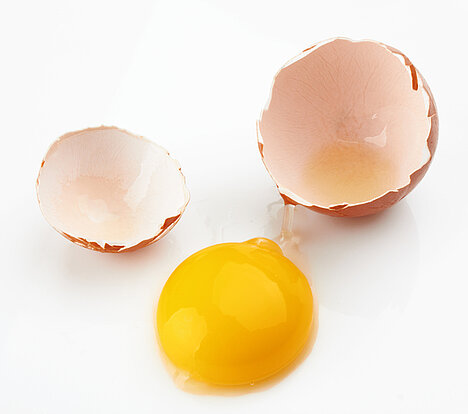Whole egg

What is whole egg?
Whole egg is nothing more than the whole egg as you know it from the shell. However, whole egg is usually pasteurized, i.e. it is briefly heated to a high temperature to kill germs. This makes the whole egg more durable and safer. Whole egg can be liquid or dried. Liquid whole egg is often sold in tetrapacks, dried whole egg in powder form.
What are the benefits of whole egg for dogs?
Whole egg is a good source of high-quality protein, which is important for muscle building and cell regeneration. Whole egg also contains many vitamins, minerals and trace elements that are important for your dog's health. These include, for example, vitamin A, biotin, iron, zinc and selenium. Whole egg can also make your dog's coat shinier and prevent skin problems.
What are the disadvantages of whole egg for dogs?
Whole egg also has some disadvantages for dogs. For one thing, whole egg can trigger allergies if your dog is sensitive to it. Symptoms can include itching, skin rashes, diarrhea or vomiting. Secondly, whole egg can contain too much cholesterol, which can lead to cardiovascular problems. Whole eggs can also contain too much phosphorus, which can disrupt your dog's calcium balance. This can lead to bone problems, especially in puppies or older dogs.
How much whole egg can my dog eat?
The amount of whole egg your dog is allowed to eat depends on various factors. These include, for example, your dog's size, weight, age and activity level. The quality of the whole egg and the way it is prepared also play a role. As a general rule, whole eggs should only be used as a supplement to your dog's normal diet and should not account for more than 10 percent of his daily calories. This corresponds to around half an egg to a whole egg per day for a medium-sized dog. If you want to feed your dog whole egg, you should make sure that it is pasteurized and contains no additives. You should also always cook or heat the whole egg thoroughly to avoid salmonella.
Whole egg can be a useful addition to a dog's diet if fed in moderation. It provides valuable protein and important nutrients for your dog. However, you should also be aware of the potential risks of whole egg, such as allergies, cholesterol and phosphorus.
If you notice any signs of hypersensitivity or poisoning in your dog, you should see your vet immediately. We are not a substitute for a vet, but we try to be as accurate as possible. Every dog reacts differently and we recommend you get a second opinion or consult your vet if in doubt.
Stay healthy and take good care of your four-legged friend!😊